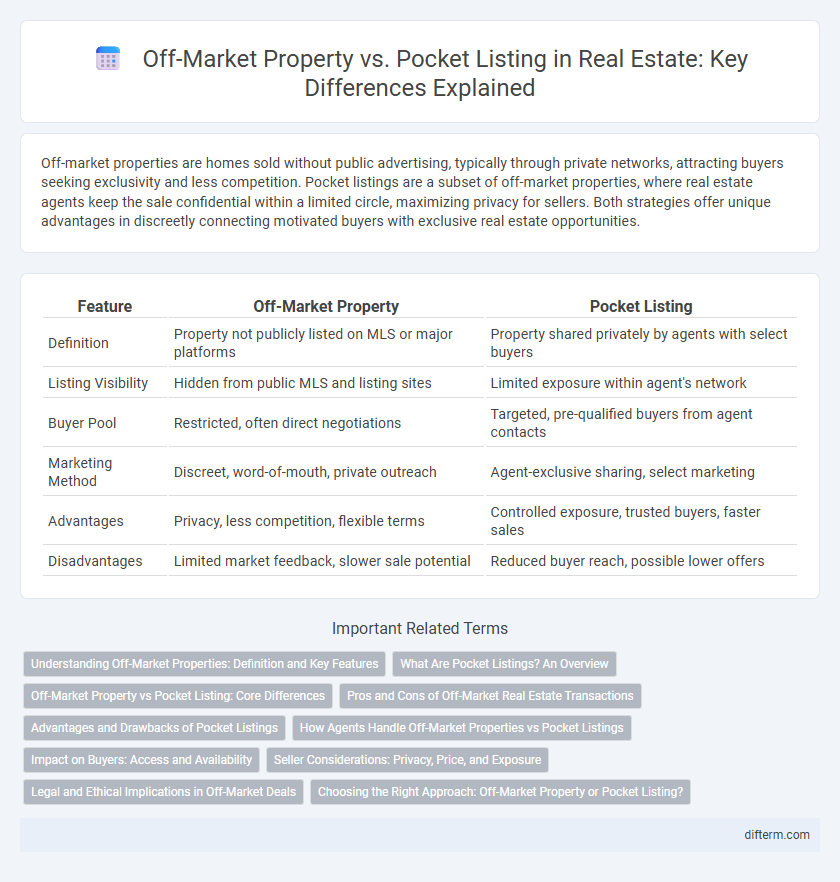Off-market properties are homes sold without public advertising, typically through private networks, attracting buyers seeking exclusivity and less competition. Pocket listings are a subset of off-market properties, where real estate agents keep the sale confidential within a limited circle, maximizing privacy for sellers. Both strategies offer unique advantages in discreetly connecting motivated buyers with exclusive real estate opportunities.
Table of Comparison
| Feature | Off-Market Property | Pocket Listing |
|---|---|---|
| Definition | Property not publicly listed on MLS or major platforms | Property shared privately by agents with select buyers |
| Listing Visibility | Hidden from public MLS and listing sites | Limited exposure within agent's network |
| Buyer Pool | Restricted, often direct negotiations | Targeted, pre-qualified buyers from agent contacts |
| Marketing Method | Discreet, word-of-mouth, private outreach | Agent-exclusive sharing, select marketing |
| Advantages | Privacy, less competition, flexible terms | Controlled exposure, trusted buyers, faster sales |
| Disadvantages | Limited market feedback, slower sale potential | Reduced buyer reach, possible lower offers |
Understanding Off-Market Properties: Definition and Key Features
Off-market properties refer to real estate listings not publicly advertised on traditional Multiple Listing Services (MLS), allowing for discreet sales often used by sellers seeking privacy or testing market interest. These properties are typically marketed through private networks, exclusive contacts, or direct outreach, providing limited access to buyers but potentially lower competition. Key features include confidentiality, potential price negotiation flexibility, and unique investment opportunities away from the broad public market.
What Are Pocket Listings? An Overview
Pocket listings are properties marketed privately by real estate agents without public exposure on the Multiple Listing Service (MLS), targeting select buyers through exclusive networks. These listings provide sellers confidentiality and control over the sale process while limiting market competition, often resulting in faster transactions. Pocket listings differ from off-market properties, which may never enter MLS, as pocket listings involve intentional, private promotion rather than no listing at all.
Off-Market Property vs Pocket Listing: Core Differences
Off-market properties are real estate listings not publicly advertised on the MLS, available through private networks, while pocket listings are specific off-market deals held exclusively by brokers to maintain confidentiality and control over the sale. Off-market properties offer broader private availability, whereas pocket listings remain within a limited circle of select agents or buyers. Understanding these distinctions benefits sellers seeking discreet transactions and buyers pursuing exclusive opportunities.
Pros and Cons of Off-Market Real Estate Transactions
Off-market real estate transactions offer privacy and reduced competition, making them attractive for sellers seeking discretion and buyers aiming for less bidding wars, but they often lack market visibility, which can limit exposure and reduce potential sale price. These deals can expedite the process since they bypass traditional listing platforms, yet the absence of multiple offers might result in less favorable terms for sellers. Despite these drawbacks, off-market sales provide opportunities for exclusive negotiations and can be ideal for investors or buyers targeting niche properties unavailable to the general public.
Advantages and Drawbacks of Pocket Listings
Pocket listings offer exclusivity by limiting property exposure to a select group of buyers, which can result in faster sales and reduced market competition. However, their limited visibility may lead to lower sale prices due to reduced buyer interest and lack of market transparency. Sellers risk missing out on higher offers found through broader MLS exposure while buyers face fewer options and potential information asymmetry.
How Agents Handle Off-Market Properties vs Pocket Listings
Agents handle off-market properties by quietly marketing them to select buyers within their network, maintaining confidentiality while generating targeted interest. Pocket listings, a subset of off-market sales, are promoted exclusively through an agent's personal contacts, enabling greater control over the sale process and often yielding higher commission rates. Both strategies rely on leveraging relationships and discreet communication to bypass public MLS exposure while matching the property with qualified buyers.
Impact on Buyers: Access and Availability
Off-market properties typically remain undisclosed on public platforms, limiting buyer access and reducing market competition, which may result in fewer bidding wars but also fewer options. Pocket listings, shared privately among select agents, restrict availability to a narrow audience, often favoring insider buyers with exclusive information. Both approaches impact buyers by narrowing the pool of accessible properties, influencing market transparency and potentially affecting pricing dynamics.
Seller Considerations: Privacy, Price, and Exposure
Sellers considering off-market properties and pocket listings prioritize privacy to control who views their home, reducing unsolicited visits and maintaining discretion. Price flexibility often favors off-market sales, allowing private negotiations without public market pressure, while pocket listings may still expose the property to a select group of agents, balancing some exposure with limited competition. Exposure levels differ significantly; off-market sales minimize broad visibility, ideal for sensitive transactions, whereas pocket listings leverage agent networks to attract targeted buyers while keeping the sale relatively contained.
Legal and Ethical Implications in Off-Market Deals
Off-market properties and pocket listings both operate outside traditional Multiple Listing Services (MLS), raising distinct legal and ethical implications. Off-market deals may face increased scrutiny regarding disclosure requirements and fair housing laws, while pocket listings risk conflicts of interest and reduced market transparency. Real estate agents must ensure compliance with state regulations and maintain ethical standards to protect client interests and avoid potential litigation.
Choosing the Right Approach: Off-Market Property or Pocket Listing?
Choosing between an off-market property and a pocket listing requires understanding their distinct advantages in real estate strategy; off-market properties offer exclusivity and reduced competition, while pocket listings provide targeted marketing through select agents. Market conditions, seller privacy preferences, and the urgency of the sale influence the optimal approach. Evaluating factors like potential buyer reach, transaction speed, and confidentiality helps determine whether an off-market or pocket listing best suits the property's unique goals.
off-market property vs pocket listing Infographic

 difterm.com
difterm.com